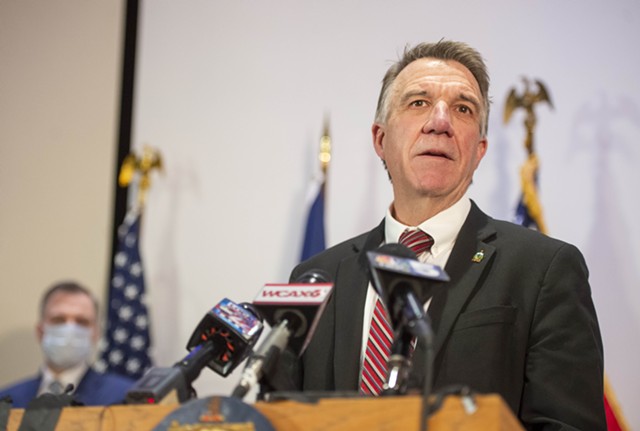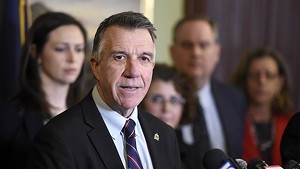Updated at 6:45 p.m.
Gov. Phil Scott on Tuesday vetoed a bill that would have ensured people couldn't buy firearms unless they passed a federal background check, but he signaled willingness to work with lawmakers on “a more reasonable standard.”
The legislation, S.30,
sought to close the so-called “Charleston loophole" that allows people to buy guns if the Federal Bureau of Investigation hasn't finished a required background check within three days. The bill would have made someone wait until the background check was complete, regardless of how long it took.
In his veto message, Scott instead proposed a seven-day waiting period, which he said would better balance people's Second Amendment rights with the federal governments’ need to complete the required checks.
“I’m willing to work with the Legislature to find a path forward that gives the federal government more time to fulfill its obligations to complete background checks, without denying law-abiding citizens of their right to a fair and reasonable process,” Scott wrote in his veto message.
Closing the “Charleston loophole” has been a top priority for gun control advocates for several years. The gap in gun regulations is how a 21-year-old white supremacist was able to buy the .45-caliber pistol that he used to kill nine members of a Bible study group at Mother Emanuel AME Church in Charleston, S.C., in 2015.
Anyone who wants to purchase a firearm must first pass a background check under the National Instant Criminal Background Check System. Most such checks involve instant approval while others take more time. If, after three days, the system has not issued a “red flag” denying the person the right to purchase the gun, the purchase is allowed.
Vermont lawmakers debated how long to extend the period, some proposing 15 days, others 30. But the background check process expires after 30 days, so lawmakers ultimately decided to make the waiting period indefinite. Potential buyers in Vermont would not be approved until the federal system approved them for the purchase, however long it took. They'd have to restart the process if the background check expired.
But Scott said this placed an unfair burden on citizens.
“Instead of holding the federal government accountable to complete the background check in a timely manner, it shifts all the burden away from government — where responsibility was intentionally placed in federal law – entirely onto the citizen,” Scott wrote in his message.
The Republican governor also highlighted a number of gun laws passed in Vermont in recent years. These include universal background checks, “red flag” laws for people deemed an extreme risk to others, similar laws for people who may be a risk to themselves, and bans on bump stocks and large capacity magazines.
“It's my belief that we need to give these new provisions more time to be fully understood and utilized, and that the Legislature should focus on educating Vermonters on these changes – and on addressing Vermont’s mental health crisis – before additional gun laws are passed,” he wrote.
In a statement after Scott's veto, Senate President Pro Tempore Becca Balint (D-Windham) said she had "serious concerns" about Scott's proposal for a seven-day delay. Balint said she's "discussing next steps" with members of the House and Senate. A veto override requires yes votes from two-thirds of the members in each chamber.
The Senate cleared that hurdle when it initially passed the bill by a 21-9 margin. And the House came close, with a 97-49 vote.
"Our intent in the Senate was to truly close the loophole, so guns couldn’t get into the hands of people who shouldn’t have them. The Governor’s proposal leaves it open," Balint wrote. "This proposal could be particularly risky to victims of domestic violence, as it takes an average of close to 10 days for federal background check denials related to domestic violence."















Comments
Comments are closed.
From 2014-2020, Seven Days allowed readers to comment on all stories posted on our website. While we've appreciated the suggestions and insights, right now Seven Days is prioritizing our core mission — producing high-quality, responsible local journalism — over moderating online debates between readers.
To criticize, correct or praise our reporting, please send us a letter to the editor or send us a tip. We’ll check it out and report the results.
Online comments may return when we have better tech tools for managing them. Thanks for reading.